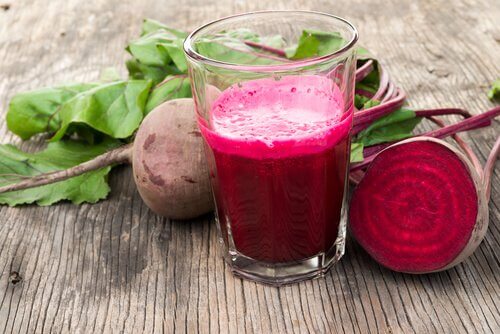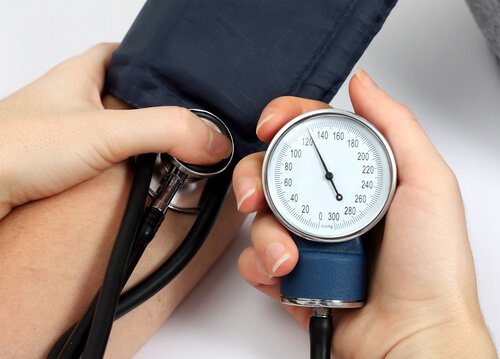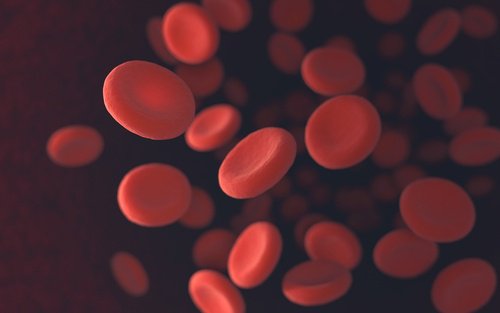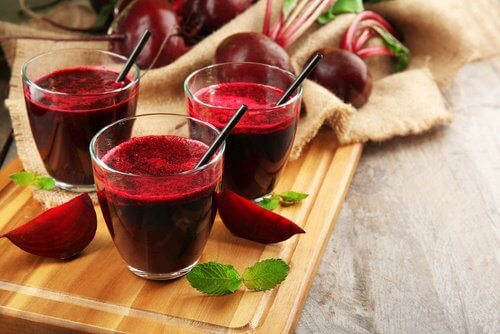Discover the Benefits Your Body Gets from Drinking Beet Juice


Reviewed and approved by the doctor José Gerardo Rosciano Paganelli
The beet is one of the oldest vegetables on the planet, originating along the coasts of North Africa, Asia, and Europe. Initially, people only consumed the leafy greens, but it was later discovered that the red, sweet root vegetable was a great source of nutrients. This is when drinking beet juice became culturally acceptable.
Today it’s part of cuisines all over the world and. Manufacturers also use it as a source of sugar.
Most people prefer to eat cooked beets in dishes like salads, but experts recommend consuming them raw to obtain their full benefits.
Although beets do contain sugar, you can eat them without reservation once or twice a week.
To be sure you don’t have any lasting doubts about beet juice, today we want to share some of the major benefits of drinking beet juice.
Discover them!
Beetroot provides many nutrients
As already mentioned, one of the main components of beets is sugar. This gives it its characteristic sweet flavor, but also doesn’t make it a more caloric option than many other vegetables.
It also contains fiber and very low amounts of protein and fat. It also contains minerals (potassium, iron, phosphorus, and iodine, among others) and vitamins C and group B.
It lowers blood pressure

High blood pressure is one of the main risk factors for mortality worldwide and is a problem that continues to grow. People with high blood pressure levels may benefit from consuming beetroot juice daily.
This is because beets are a natural source of nitrites, which are converted into nitric oxide in the body. They dilate and relax your blood vessels, ultimately stimulating better circulation.
See also: Does Cocoa Help Lower Cholesterol? This Is What Science Says
It improves digestion
Thanks to their significant content of fiber and antioxidants, beets can really help improve your digestion. Drinking beet juice fights constipation, alleviates inflammation, and improves the absorption of nutrients from food.
Beet juice is also recommended for stimulating the appetite and supporting the digestion of proteins and fats.
Beet juice fights free radicals
Beets contain betalains and polyphenols, two powerful antioxidants that neutralize the damaging effects caused by free radicals.
Thanks to this, premature aging of cells is prevented, as well as the development of serious conditions such as cancer. There’s scientific evidence that beet supplementation could serve to strengthen the body’s own antioxidant compounds.
It improves your physical performance

Some athletes prefer to drink beet juice instead of sports or energy drinks. That’s because it can enhance their physical performance without the chemical stimulants.
It’s estimated that after consuming a glass of beet juice, performance when exercising can be increased by up to 16%. In addition, it improves lung capacity, which helps prevent rapid fatigue.
As the authors of this review of studies from 2017 indicate, beets exert different actions in this regard. The presence of nitric oxide allows to an increase in blood flow and gas exchange. It also increases mitochondrial efficiency and strengthens muscle contraction.
Beet juice protects the thyroid gland
Thyroid problems are often the result of an iodine deficiency.
Beets provide high quantities of this mineral, which is recommended for people who suffer from hypothyroidism or goiters.
It fights inflammation
Beets are an important source of betaine, a nutrient that protects cells, proteins, and enzymes from environmental stress.
This, in turn, helps control inflammation by caring for your internal organs and protecting them from chronic disorders.
It fights anemia

People who have been diagnosed with anemia can supplement their diet with regular consumption of this natural juice. The high content of iron and folic acid increases your body’s production of red blood cells, boosting your health recovery time.
It relieves fluid retention
Beets are a powerful diuretic that helps your body eliminate excess fluids that become trapped in your tissues.
This is because they have a high potassium content with low amounts of sodium, which help to balance the filtration processes that take place in your kidneys.
In general, beet consumption can help people who suffer from:
- Gout and arthritis
- Hyperuricemia
- Kidney stones
- Oliguria
- Kidney infections
Beets can help you lose weight

Beet juice is very low in calories and contains large amounts of fiber, vitamins, and minerals that support a weight loss diet.
Drinking it on a daily basis supports good metabolic function, controls the appetite, and helps you eliminate waste to favor weight loss.
We recommend you read: Healthy Morning Weight Loss Routine
It’s detoxifying
The pigment in beets, along with the antioxidants and fiber content, support your body’s detox processes to get rid of toxins that build up in the bloodstream.
It’s a great remedy for people with fatty liver disease because it promotes the cleansing of the liver and speeds up your recovery time. Beets are also great for the health of your kidneys, colon, and lungs.
How to make beet juice?

To make this natural juice, all you need are beets and a little water. If you like, you can add other fruits for flavor, such as apples or carrots.
Ingredients
- 3 beets
- 1 cup of water (200 ml)
Instructions
- Thoroughly peel and wash the beets and cut them into large pieces.
- Add them to a blender with the water, and process until you get a smooth liquid.
- Drink this immediately. You can have it once a day.
Precautions and advice on the consumption of beet juice
Moderate beet consumption is generally safe for the entire population. However, despite all the benefits it entails, it shouldn’t be abused and integrated into the framework of a varied and balanced diet.
This is especially important during pregnancy and lactation. During these periods, beet juice should not be used as a medicine or supplement.
People with low blood pressure should make moderate use of beet juice. Due to the presence of potassium, this could decrease even more. Adequate control of pressure levels should be maintained.
People with a tendency to form calcium oxalate stones should also take precautions. In addition, consumed in large quantities, beets can worsen kidney pathologies.
In addition, and as a curiosity, it must be taken into account that the consumption of beets can lead to a condition known as beeturia. This is the possible red coloration of urine and feces after ingestion of this vegetable. Although it’s harmless, it’s best to know about it so it doesn’t cause any surprises.
In conclusion, the juice of this vegetable is a powerful ally in taking care of the body and protect us against diseases. Introduce it in moderation in your diet and encourage yourself to prepare it and consume it to notice the changes in your body.
All cited sources were thoroughly reviewed by our team to ensure their quality, reliability, currency, and validity. The bibliography of this article was considered reliable and of academic or scientific accuracy.
- Aliahmadi, M., Amiri, F., Bahrami, L. S., Hosseini, A. F., Abiri, B., & Vafa, M. (2021). Effects of raw red beetroot consumption on metabolic markers and cognitive function in type 2 diabetes patients. Journal of Diabetes & Metabolic Disorders, 20, 673-682. https://link.springer.com/article/10.1007/s40200-021-00798-z
- Bonilla Ocampo, D. A., Paipilla, A. F., Marín, E., Vargas-Molina, S., Petro, J. L., & Pérez-Idárraga, A. (2018). Dietary Nitrate from Beetroot Juice for Hypertension: A Systematic Review. Biomolecules, 8(4),134. https://www.ncbi.nlm.nih.gov/pmc/articles/PMC6316347/
- Chang, P. Y., Hafiz, M. S., & Boesch, C. (2018). Beetroot juice attenuates glycaemic response in healthy volunteers. Proceedings of the Nutrition Society, 77(4), 165. https://www.cambridge.org/core/journals/proceedings-of-the-nutrition-society/article/beetroot-juice-attenuates-glycaemic-response-in-healthy-volunteers/ABB3F8FA2F34A95B152F2F08B06FBC8D
- Gheith, I., & El-Mahmoudy, A. (2018). Laboratory evidence for the hematopoietic potential of Beta vulgaris leaf and stalk extract in a phenylhydrazine model of anemia. Brazilian journal of medical and biological research = Revista brasileira de pesquisas medicas e biologicas, 51(11), 1-8. https://www.ncbi.nlm.nih.gov/pmc/articles/PMC6190212/
- Jones, L., Bailey, S. J., Rowland, S. N., Alsharif, N., Shannon, O. M., & Clifford, T. (2022). The Effect of Nitrate-Rich Beetroot Juice on Markers of Exercise-Induced Muscle Damage: A Systematic Review and Meta-Analysis of Human Intervention Trials. Journal of dietary supplements, 19(6), 749–771. https://pubmed.ncbi.nlm.nih.gov/34151694/
- Jones, T., Dunn, E. L., Macdonald, J. H., Kubis, H. P., McMahon, N., & Sandoo, A. (2019). The Effects of Beetroot Juice on Blood Pressure, Microvascular Function and Large-Vessel Endothelial Function: A Randomized, Double-Blind, Placebo-Controlled Pilot Study in Healthy Older Adults. Nutrients, 11(8), 1-17. https://www.ncbi.nlm.nih.gov/pmc/articles/PMC6722817
- Lotfi, M., Azizi, M., Tahmasbi, W., & Bashiri, P. (2018). The effects of consuming 6 weeks of beetroot juice (Beta vulgaris L.) on hematological parameters in female soccer players. Journal of Kermanshah University of Medical Sciences, 22(3). https://brieflands.com/articles/jkums-82300.html
- Miraftabi, H., Avazpoor, Z., Berjisian, E., Sarshin, A., Rezaei, S., Domínguez, R., Reale, R., Franchini, E., Samanipour, M. H., Koozehchian, M. S., Willems, M. E. T., Rafiei, R., & Naderi, A. (2021). Effects of Beetroot Juice Supplementation on Cognitive Function, Aerobic and Anaerobic Performances of Trained Male Taekwondo Athletes: A Pilot Study. International journal of environmental research and public health, 18(19), 1-17. https://www.cochranelibrary.com/central/doi/10.1002/central/CN-02321876/full
- Moreno-Ley, C. M., Osorio-Revilla, G., Hernández-Martínez, D. M., Ramos-Monroy, O. A., & Gallardo-Velázquez, T. (2021). Anti-inflammatory activity of betalains: a comprehensive review. Human Nutrition & Metabolism, 25. https://www.sciencedirect.com/science/article/pii/S2666149721000086
- Ranchal-Sanchez, A., Diaz-Bernier, V. M., De La Florida-Villagran, C. A., Llorente-Cantarero, F. J., Campos-Perez, J., & Jurado-Castro, J. M. (2020). Acute effects of beetroot juice supplements on resistance training: A randomized double-blind crossover. Nutrients, 12(7), 1-14. https://www.mdpi.com/2072-6643/12/7/1912
- Shepherd, A. I., Costello, J. T., Bailey, S. J., Bishop, N., Wadley, A. J., Young-Min, S., Gilchrist, M., Mayes, H., White, D., Gorczynski, P., Saynor, Z. L., Massey, H., & Eglin, C. M. (2019). “Beet” the cold: beetroot juice supplementation improves peripheral blood flow, endothelial function, and anti-inflammatory status in individuals with Raynaud’s phenomenon. Journal of applied physiology, 127(5), 1478–1490. https://www.cochranelibrary.com/central/doi/10.1002/central/CN-01981274/full
- Triana, H., Hadisaputro, S., & Djamil, M. (2020). Effect of Beet Powder (Beta Vulgaris L) with Fe Supplementation on Increasing Hemoglobin, Hematocrit, and Erythrocyte Levels in Pregnant Women with Anemia. STRADA Jurnal Ilmiah Kesehatan, 9(2), 893-899. https://www.sjik.org/index.php/sjik/article/view/354
- Wootton-Beard, P. C., Brandt, K., Fell, D., Warner, S., & Ryan, L. (2014). Effects of a beetroot juice with high neobetanin content on the early-phase insulin response in healthy volunteers. Journal of Nutritional Science, 3, 1-9. https://www.cambridge.org/core/journals/journal-of-nutritional-science/article/effects-of-a-beetroot-juice-with-high-neobetanin-content-on-the-earlyphase-insulin-response-in-healthy-volunteers/535AAA8B832FBE11FDD4692C968187B9
- Zamani, H., De Joode, M. E. J. R., Hossein, I. J., Henckens, N. F. T., Guggeis, M. A., Berends, J. E., … & van Breda, S. G. J. (2021). The benefits and risks of beetroot juice consumption: A systematic review. Critical reviews in food science and nutrition, 61(5), 788-804. https://www.tandfonline.com/doi/full/10.1080/10408398.2020.1746629
This text is provided for informational purposes only and does not replace consultation with a professional. If in doubt, consult your specialist.








